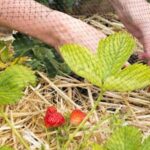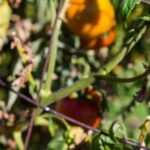In vegetable gardens, it is essential to prioritize organic insect control methods to ensure the health and productivity of your plants. Chemical pesticides may seem like a quick fix, but they can pose significant risks to our health and the environment. In this article, we will explore the importance of opting for homemade organic insect control solutions, as well as the potential harm associated with chemical pesticides.
When it comes to protecting your vegetable plants from pests, it’s crucial to understand the impact these insects can have on your garden. Not only do they eat away at your precious crops, but they can also weaken the overall health of your plants and reduce their productivity. By identifying common garden pests and understanding the damage they can cause, you can take proactive measures to prevent infestations and preserve the vitality of your vegetable garden.
Prevention is key in maintaining a healthy garden ecosystem that naturally deters pests. By creating a balanced environment that attracts beneficial insects and predators, you can significantly reduce the presence of harmful pests. In the following sections, we will discuss how to encourage these helpful allies in your garden and provide practical tips on creating an ecosystem that works in harmony with nature.
Join us as we delve into various homemade sprays and solutions using everyday ingredients that effectively control insects while keeping your vegetable garden free from harmful chemicals. We will also explore companion planting techniques that repel or deter common garden pests and discuss how physical barriers can protect your precious plants from insect infestations.
By adopting an integrated pest management approach and regularly monitoring for early signs of infestation, you can take charge of organic insect control in your vegetable garden. Together, let’s embrace a healthier and more sustainable approach to gardening by prioritizing homemade organic insect control methods for our beloved greenspaces.
Identifying Common Garden Pests and Their Impact on Vegetable Plants
Common garden pests can wreak havoc on vegetable plants, causing damage and threatening the overall health and productivity of your garden. It is important to be able to identify these pests and understand their impact in order to effectively control their populations. By familiarizing yourself with common garden pests, you can take proactive measures to prevent infestations and protect your vegetable plants.
One common pest that often targets vegetable gardens is the aphid. These tiny insects have piercing-sucking mouthparts that they use to feed on the sap of plants. Aphids reproduce rapidly, so a small infestation can quickly escalate into a larger problem. They cause damage by sucking out vital nutrients from the leaves, buds, and stems of vegetable plants, leading to stunted growth and distorted foliage.
Another common garden pest is the cabbage worm or cabbage looper. These green caterpillars are voracious eaters and can quickly decimate a crop of leafy greens such as cabbage, kale, or broccoli. They chew holes in the leaves, leaving behind unsightly damage that not only affects the appearance of the plants but also reduces their ability to photosynthesize effectively.
Other common pests include tomato hornworms, flea beetles, and squash bugs, each with their own unique methods of damaging vegetable plants. Tomato hornworms are large caterpillars that feed on tomato plants and other members of the nightshade family. They can strip leaves entirely, defoliating a plant within days if left unchecked.
Flea beetles create small holes in the leaves of cole crops like broccoli or cabbage, which not only looks unattractive but also weakens the plant’s ability to grow and produce abundantly. Squash bugs tend to attack squash plants by feeding on their leaves and stems. Their feeding activity weakens the plant over time, causing wilted leaves and decreased fruit production.
Understanding these common garden pests allows you to be vigilant in spotting early signs of infestation and taking appropriate action. By regularly inspecting your vegetable plants for visible damage, pests, or even eggs, you can intervene early and prevent the pests from causing further harm.
Prevention
Creating a healthy garden ecosystem is essential for preventing and minimizing insect infestations in vegetable gardens. By maintaining a balanced ecosystem, you can naturally deter pests and promote the overall health and productivity of your garden. Here are some tips to help you create a healthy garden ecosystem:
- Encourage Beneficial Insects: Beneficial insects, such as ladybugs, lacewings, and hoverflies, play a crucial role in controlling pest populations. These insects prey on common garden pests like aphids, caterpillars, and mites. To attract beneficial insects to your garden, consider planting flowers that provide nectar and pollen sources, such as marigolds, sunflowers, yarrow, and daisies.
- Practice Crop Rotation: Crop rotation involves changing the location of vegetable crops each year to prevent the buildup of pest populations that specifically target certain plants. By rotating your crops annually, you disrupt the life cycle of pests and reduce their overall impact on your vegetable plants.
- Use Organic Fertilizers: Chemical fertilizers can harm beneficial organisms in the soil and disrupt the natural balance of your garden ecosystem. Instead, opt for organic fertilizers like compost or well-rotted manure. These organic amendments enrich the soil with nutrients while promoting microbial activity that helps break down organic matter.
- Provide Habitat Diversity: Creating diverse habitats in your garden can attract a wider range of insects that contribute to natural pest control. Consider incorporating features like wood piles or rock piles where beneficial insects can find shelter or nesting sites.
By implementing these prevention strategies in your vegetable garden, you can promote a healthy garden ecosystem that naturally deters pests while supporting the growth and productivity of your plants.
| Tips for Creating a Healthy Garden Ecosystem |
|---|
| Encourage Beneficial Insects |
| Practice Crop Rotation |
| Use Organic Fertilizers |
| Provide Habitat Diversity |
Homemade Sprays and Solutions
In addition to cultivating a healthy garden ecosystem and incorporating beneficial companion plants, another effective way to control pests in your vegetable garden is by using homemade organic sprays and solutions. These natural recipes are not only safe for the environment but also for you, your family, and your pets. Here are a few simple yet powerful DIY insect control recipes that you can easily make at home:
- Garlic-Pepper Spray: To deter pests such as aphids, spider mites, and cabbage loopers, mix one head of crushed garlic with two tablespoons of cayenne pepper powder in a gallon of water. Let the mixture sit overnight before straining it into a spray bottle. Spray onto the leaves of affected plants every few days until the infestation subsides.
- Neem Oil Spray: Neem oil is derived from the seeds of the neem tree and has insecticidal properties against many common garden pests. Mix two tablespoons of neem oil with one teaspoon of liquid dish soap in a quart of warm water. Shake well before spraying onto affected plants, focusing on both sides of the leaves. Repeat every 7-14 days or as needed.
- Soap Spray: A simple solution made from liquid dish soap can help control soft-bodied insects like aphids, mealybugs, and whiteflies. Mix one to two teaspoons of mild liquid soap (avoid using dish soaps with bleach or antibacterial ingredients) with a quart of water in a spray bottle. Thoroughly coat all surfaces of infested plants with the solution, making sure to target the underside of leaves where pests often hide.
Remember to always test these homemade sprays on a small area of your plant first to ensure that they do not cause any adverse effects like leaf burn or discoloration. Additionally, it’s important to note that these organic sprays work best when applied in the early morning or late evening hours when temperatures are cooler and beneficial insects are less active.
By incorporating these homemade sprays and solutions into your organic insect control routine, you can effectively target and eliminate garden pests while promoting a healthier and more sustainable garden environment. Remember to always practice regular monitoring and early detection of pest infestations to address issues before they become severe. With these natural recipes and proactive measures, you’ll be well on your way to a thriving vegetable garden free from harmful chemicals and pesky insects.
Beneficial Companion Plants for Pest Control in Vegetable Gardens
Companion planting is a technique that has been used for centuries to enhance the growth and health of plants. By strategically planting certain plants alongside your vegetable garden, you can naturally repel or deter common garden pests. These companion plants act as natural insect control measures, reducing the need for chemical pesticides and promoting a healthier garden ecosystem.
Marigolds
Marigolds are known for their vibrant flowers, but they also have powerful pest-repellent properties. The strong scent of marigolds deters many common vegetable garden pests, including aphids, nematodes, and whiteflies. Plant marigolds around the perimeter of your vegetable garden or intersperse them among your crops for maximum effectiveness.
Nasturtiums
Nasturtiums are not only beautiful additions to your garden with their vibrant blooms, but they also function as excellent companion plants for pest control. Nasturtiums attract aphids away from your vegetable plants, acting as sacrificial hosts. Aphids are drawn to nasturtiums instead of vegetables, protecting your crops from these destructive pests.
Basil
Basil is not only a fragrant culinary herb; it also acts as a natural insect repellent. Its strong aroma repels flies and mosquitoes, while also deterring tomato hornworms and aphids. Plant basil near tomatoes or peppers to protect them from these common pests.
Lavender
Lavender is known for its calming scent and beautiful purple flowers. However, it is also highly effective in repelling insects such as moths, fleas, and mosquitoes due to its strong fragrance. Plant lavender near your vegetables to keep pesky insects at bay.
When using companion plants for pest control in vegetable gardens, it’s important to consider the specific needs and preferences of different plants. Some prefer full sun while others thrive in partial shade, so be sure to choose companion plants that are compatible with your vegetable crops. By incorporating these beneficial plants into your garden, you can naturally deter pests and create a more sustainable and organic environment for your vegetables to flourish.
Physical Barriers
When it comes to protecting your vegetable plants from insect infestations, physical barriers can be an effective and sustainable solution. By implementing these barriers, you create a physical barrier between your plants and the insects, preventing them from reaching and damaging your crops. Here are some practical tips on how to effectively install and maintain physical barriers in your garden:
- Row Covers: Row covers are a popular choice for protecting vegetable plants from a variety of pests, including aphids, squash bugs, and cabbage worms. These covers are typically made of lightweight fabric or netting that allows sunlight, air, and water to reach the plants while keeping pests out.
To install row covers, simply drape the fabric over hoops or stakes placed along the rows of plants. Secure the edges with weights or by burying them in the soil. - Netting: Netting is another effective physical barrier that can protect vegetable plants from larger pests like birds and rabbits. Choose a netting mesh size that is small enough to keep pests out while still allowing adequate airflow and sunlight.
To install netting, create a frame using stakes or PVC pipes around your garden bed or individual plants, then cover it with the netting material. Secure the edges of the netting tightly to prevent any gaps where pests could enter. - Floating Row Covers: Floating row covers are similar to regular row covers but provide an additional benefit by creating a microclimate around your plants. These covers are made of lightweight fabric that can be draped directly over young seedlings or transplants without the need for supporting structures. Floating row covers not only protect against insect pests but also provide insulation during cooler weather and can help extend the growing season for certain crops.
Remember to regularly check and maintain your physical barriers to ensure they remain effective. Inspect them for any tears, gaps, or signs of wear and repair or replace them as needed. Additionally, monitor your plants closely for any signs of insect activity that may have bypassed the barriers.
By implementing physical barriers in your vegetable garden, you can significantly reduce the risk of insect infestations and protect your crops in an organic and sustainable way. These barriers not only provide a shield against pests but also create a controlled environment that promotes healthy growth and productivity. With proper installation and maintenance, physical barriers can be a valuable tool in your arsenal of organic insect control methods.
Integrated Pest Management
Integrated Pest Management (IPM) is a comprehensive approach to pest control that focuses on minimizing the use of chemical pesticides and instead emphasizes prevention, monitoring, and intervention strategies to manage insect pests in a more sustainable manner. By adopting IPM strategies in your vegetable garden, you can effectively address insect infestations while still maintaining a healthy garden ecosystem.
The Key Principles of IPM
IPM involves several key principles that guide its implementation. First and foremost, prevention is prioritized as the best form of pest control. This means taking proactive measures to reduce the conditions that attract insects and create an environment conducive to their growth and reproduction. This may include proper soil management, crop rotation, and good plant health practices such as regular watering and fertilization.
Monitoring is another crucial aspect of IPM. By regularly inspecting your vegetable plants for signs of pest infestation, you can detect any issues early on before they become major problems. Monitoring can involve visual inspection of leaves, stems, and fruits for signs of damage or presence of pests, as well as setting up traps or using pheromone lures to monitor pest populations.
Once pests are detected through monitoring, intervention measures are employed based on established thresholds. Thresholds refer to the point at which intervention measures should be taken to prevent significant damage or economic loss. These measures can vary depending on the specific pest and situation but may include cultural controls (e.g., removing affected plant parts), biological controls (e.g., introducing beneficial insects), or targeted treatments with natural insecticides if necessary.
Applying IPM in Your Vegetable Garden
To apply IPM in your vegetable garden effectively, it’s important to start by identifying the specific pests that commonly affect your crops. Understanding the life cycle and behavior of these pests will help inform your prevention and intervention strategies.
Additionally, it’s crucial to create a diverse and resilient garden ecosystem that attracts beneficial insects and predators that naturally prey on common garden pests. This can be achieved by planting a variety of companion plants known to repel or deter pests.
Regular monitoring is key to the success of IPM. Make it a habit to inspect your plants on a regular basis and keep an eye out for any signs of pest infestation. By catching pest problems early, you can take swift action and prevent them from spreading or causing significant damage.
Monitoring and Early Detection
One of the most important aspects of organic insect control for vegetable gardens is monitoring and early detection of insect infestations. By regularly checking your vegetable plants for signs of pests, you can take immediate action to prevent further spread and minimize damage to your crops.
When monitoring your garden, look for any abnormal signs on your plants such as chewed leaves, discolored foliage, or wilting. These signs may indicate the presence of pests. Additionally, keep an eye out for any insects themselves, as they can often be found clustered around damaged areas or hiding under leaves.
To effectively spot insect infestations, it’s essential to familiarize yourself with common garden pests that commonly target vegetable plants. Some common culprits include aphids, caterpillars, beetles, and mites. Each pest may exhibit different feeding habits and cause distinct types of damage. By knowing what to look for and being able to accurately identify the pest causing the issue, you can quickly implement appropriate control measures.
Early detection is key because it allows you to take action before an infestation becomes too severe. Once an infestation has taken hold and populations have multiplied, it becomes much more difficult to eradicate the pests without resorting to chemical pesticides. By actively monitoring your garden and catching pest problems early on, you can better protect the health and productivity of your vegetable plants without compromising on organic principles.
Conclusion
In conclusion, opting for organic insect control methods in vegetable gardens is not only important for the health and productivity of our plants, but also for our overall well-being and the environment. Chemical pesticides can have detrimental effects on both human health and the ecosystem, making it crucial to explore natural alternatives.
By creating a balanced garden ecosystem, utilizing homemade sprays and solutions, planting beneficial companion plants, using physical barriers, practicing integrated pest management, and monitoring for early detection of infestations, we can take charge of organic insect control in our vegetable gardens.
Maintaining a healthy garden ecosystem is essential in naturally deterring pests. By encouraging beneficial insects and predators that prey on common garden pests, we can create a system where natural pest control occurs without the need for harmful chemicals. Additionally, homemade sprays and solutions provide effective organic insect control by utilizing everyday ingredients. These recipes are safe to use and target specific pests while avoiding harm to beneficial insects.
Planting companion plants alongside vegetables is another effective method of organic insect control. Certain plants have natural properties that repel or deter common garden pests. By strategically incorporating these companion plants into our vegetable gardens, we can reduce the risk of pest infestations without resorting to synthetic pesticides.
Physical barriers such as row covers and netting offer a protective shield against insects reaching our vegetable plants. When installed correctly and maintained properly, these barriers act as an additional measure to keep pests at bay. Integrated pest management (IPM) takes a comprehensive approach by combining various tactics to manage insect populations while minimizing harm to beneficial organisms.
Constant monitoring is crucial in identifying signs of infestations early on before they cause significant damage. Regularly inspecting the leaves, stems, and fruits enables us to take immediate action if necessary. By promptly addressing issues through organic means, such as removing affected plant parts or applying homemade sprays, we can prevent further spread of pests.
Frequently Asked Questions
How do you make organic insecticide for vegetables?
Organic insecticides for vegetables can be made using natural ingredients that are safe for both the plants and the environment. One common method is to create a homemade insecticidal soap by mixing a few tablespoons of liquid dish soap with water in a spray bottle. This solution can be sprayed directly onto the pests or on the affected plants, as it has the ability to suffocate them by clogging their respiratory systems.
Another option is to make a garlic and chili pepper spray by blending fresh garlic cloves and chili peppers with water, then straining the mixture before applying it to the vegetables. The strong scent of garlic and capsaicin from the chili peppers acts as a deterrent for many insects. It is important to remember that even organic insecticides should be used sparingly and selectively, targeting only the affected areas to minimize any potential harm to beneficial insects.
How do I keep bugs out of my vegetable garden naturally?
Keeping bugs out of your vegetable garden naturally requires implementing various preventive measures that create an unfavorable environment for pests. One approach is companion planting, where certain plants are grown alongside vegetables as natural deterrents. For example, marigolds emit a scent that repels many insects, so planting them around your vegetables can help keep bugs away.
Additionally, creating physical barriers like row covers or netting over your crops can prevent insects from accessing them while still allowing sunlight and air through. Regularly inspecting your plants for any signs of infestation and manually removing pests or infected plant parts can also help maintain a healthy garden ecosystem naturally without relying on chemical pesticides.
Does spraying vinegar keep bugs away?
While vinegar can be effective at repelling some bugs, it does not provide comprehensive protection against all types of pests in a vegetable garden. Vinegar contains acetic acid, which has been found to deter certain insects like ants, aphids, and fruit flies due to its strong odor and acidic nature. However, its effectiveness may vary depending on the type of pest you are dealing with.
For instance, vinegar may not be as effective against larger pests like caterpillars or beetles. Moreover, it is important to note that vinegar can also harm some plants if applied directly, so caution should be exercised when using it in the garden. Overall, while spraying vinegar may help deter certain bugs, it is usually more effective when used as part of a comprehensive pest management strategy that combines multiple natural methods.

If you’re looking to get into vegetable gardening, or are just looking for some tips on how to make your current garden better, then you’ve come to the right place! My name is Ethel and I have been gardening for years. In this blog, I’m going to share with you some of my best tips on how to create a successful vegetable garden.





